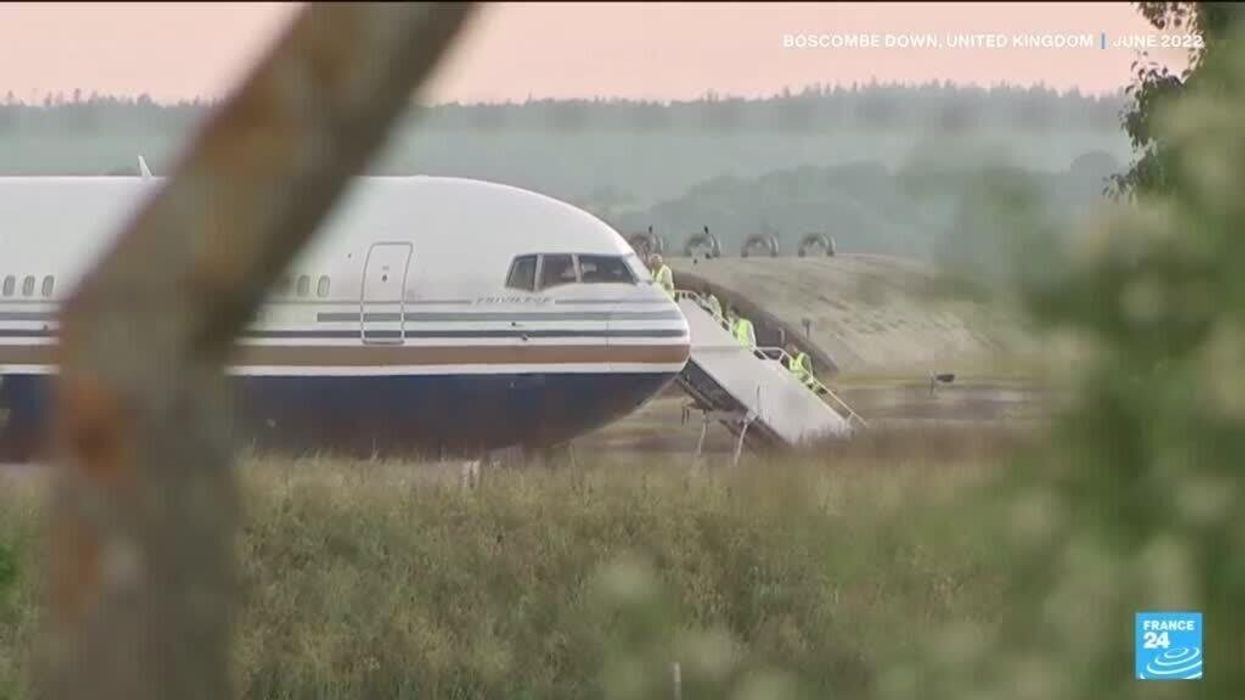UK parliament passes Rwanda asylum law as Sunak vows flights will start in 10-12 weeks
After a considerable amount of parliamentary back-and-forth known as ‘ping pong’, the Conservatives’ controversial plan to send asylum seekers to Rwanda is set to become law, with the House of Lords dropping its final two proposed amendments to the Safety of Rwanda Bill on Monday.
Peers wanted an independent monitoring committee set up to declare Rwanda is a safe country before individuals are sent there, and demanded Afghans who served alongside British forces be made exempt from deportations.
However, the Lords finally bowed to pressure with Lord Anderson of Ipswich telling colleagues: “The time has now come to acknowledge the primacy of the elected house.”
So how have we got to this point, what does the Bill actually say, and what’s next?
Allow us to explain…
The grounded flight
Back in June 2022, when it was Priti Patel who was heading up the Home Office, the first flight containing asylum seekers was getting ready to take off and deport them to the African country.
Except, it never actually left the ground, due to a last-minute intervention from the European Court of Human Rights.
Patel said at the time: “Many of those removed from this flight will be placed on the next. Our legal team are reviewing every decision made on this flight and preparation for the next flight begins now.
“We will not be deterred from doing the right thing and delivering our plans.”
The legal battle in the courts
Further headaches for the UK government came via the courts, after the Court of Appeal granted an appeal by asylum seekers on the grounds of whether Rwanda was a safe country, and in June 2023 ruled the policy was unlawful.
Lord Burnett, then lord chief justice, said: “The High Court’s decision that Rwanda is a safe third country is reversed. Unless and until the deficiencies in its asylum processes are corrected, removal of asylum seekers to Rwanda will be unlawful.”
The government appealed the ruling and took it to the Supreme Court, only for them to reach the same conclusion.
President Lord Reed told the court: “The evidence shows that there are substantial grounds for believing that there is a real risk that asylum claims will not be determined properly, and that asylum seekers will therefore be at risk of being returned directly or indirectly to their country of origin.”
The government responded by building upon its previous ‘memorandum of understanding’ and introducing a new treaty, which was signed in December.
The new bill and treaty
One element of the treaty, per a UK Government factsheet, concerns the assurance that Rwanda “will not remove any person relocated under the [memorandum], in any circumstances, to a country other than the UK”.
As mentioned above, the courts were concerned asylum seekers could be returned to a country where they are at risk of persecution – also known as refoulement.
Meanwhile, a new bill stressing Rwanda is a safe country – named, rather unsurprisingly, the Safety of Rwanda (Asylum and Immigration) Bill – included a section stating “every decision-maker” such as an immigration officer or court “must conclusively treat the Republic of Rwanda as a safe country”.
It continues: “As a result … a court or tribunal must not consider a review of, or an appeal against, a decision of the Secretary of State or an immigration officer relating to the removal of a person to the Republic of Rwanda to the extent that the review or appeal is brought on the grounds that the Republic of Rwanda is not a safe country.”
The legislation also sees parts of the Human Rights Act disapplied, and on its very first page, current Home Secretary James Cleverly admits he is “unable to make a statement that, in my view, the provisions of the [bill] are compatible with the [European Convention on Human Rights], but the government nevertheless wishes the House to proceed with the bill.”
So that’s definitely not worrying in any way whatsoever…
It’s this bill which has been the subject of much debate over the past couple of months, with Lee Anderson, Brendan Clarke-Smith and Robert Jenrick all quitting high-profile roles in government or the Conservative Party to vote their own way on the legislation and amendments surrounding it.
“The first flight will leave in 10 to 12 weeks”
In a speech which saw him complain that “for almost two years our opponents have used every trick in the book to block flights and keep the boats coming”, Prime Minister Rishi Sunak said on Monday: “I can confirm that we’ve put an airfield on standby, booked commercial charter planes for specific slots, and we have 500 highly trained individuals ready to escort illegal migrants all the way to Rwanda, with 300 more trained in the coming weeks.”
The reaction
Following the bill passing all parliamentary stages, #RwandaNotInMyName trended on Twitter/X on Tuesday as social media users voiced their opposition to the “cruel” legislation:
\ud83d\udea8 BREAKING: This Government's cruel Rwanda Bill has just passed\n\nToday will forever leave a stain on the UK\u2019s moral reputation. \n \nThe UK has an obligation to provide safety to refugees. It's now vital that flights to Rwanda do not leave the tarmac.\n\nhttps://t.co/ZPxbPzY4pJ— (@)
If a Rwanda flight does take off\u2026\n\nYour bills will still be as expensive\n\nYour wait for a GP/hospital bed will still be as long \n\nYour court date will still be as delayed\n\nYour taxes will still be as high\n\n\u2026but we will all be more more morally & financially bankrupt as a nation— (@)
Tuesday also saw confirmation that five migrants, including a child, died in an attempt to cross the English Channel just hours after the bill passed.
Sign up to our free Indy100 weekly newsletter
How to join the indy100's free WhatsApp channel
Have your say in our news democracy. Click the upvote icon at the top of the page to help raise this article through the indy100 rankings.














